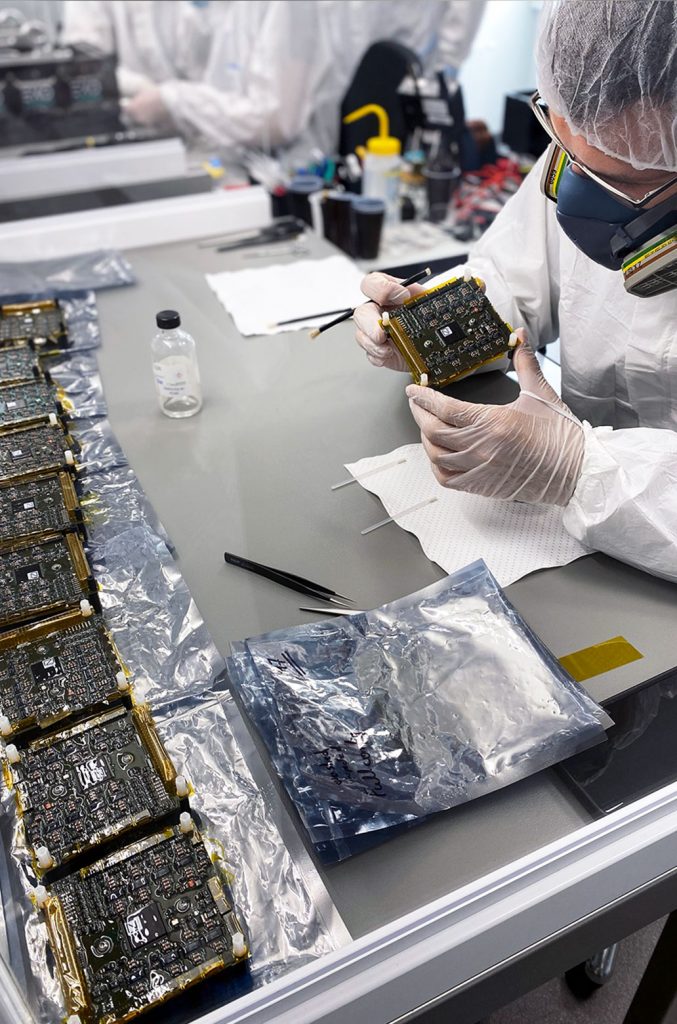Be part of the future with us!
Register now for our online product launch event on May 23rd.
The University of New South Wales (UNSW) in Sydney, Australia, has contracted mission integrator NanoAvionics to build a nanosatellite bus for UNSW’s satellite innovation laboratory. As part of the collaboration, NanoAvionics will deliver a 6U nanosatellite bus fully assembled and tested on a functional level, ready for its research and educational purposes. Payload integration for laboratory testing, modifications, and mission operations validation will be carried out by UNSW Sydney.


The intended GNSS (global navigational satellite systems) payload named “Harry v2” will consist of two “KEA” GPS receivers, developed by the Australian Centre for Space Engineering Research at UNSW, to perform remote Earth sensing operations using GPS reflectometry. Able to host multiple experiments, it will take measurements from reflections coming from the Earth while using navigation signals from other GPS satellites. The receivers, designed for both aircraft and CubeSat operations, are capable of recording intermediate frequency (IF) data and delay Doppler maps (DDM) with its associated metadata. The experiment data can be used to infer sea-state, wind speed, water-land boundaries and many other unexplored applications.
Dr. Joon Cheong, from UNSW Sydney said: ”NanoAvionics offers a suite of state-of-the-art satellite platform that is cost-effective and suitable for modern payload research and development activities to take place.”
Vytenis J. Buzas, founder and CEO of NanoAvionics, said: “The Australian space market is of immense importance to us and we are looking into expanding our footprint there. We have been supplying Australian research centres and educational institutions with nanosatellite technology since the inception of the company. We keep nurturing these relationships by transferring our knowledge in nanosatellite technology with them.
“NanoAvionics is already working with several Australian companies, acting as a technology partner, with intentions to provide our satellites for institutional and commercial segments, mostly for Earth Observation and IoT missions. As a result, and due to Australia’s constant development in the space industry, NanoAvionics is exploring the possibility to establish local capabilities in the region.”
About NanoAvionics
NanoAvionics is a smallsat bus manufacturer and mission integrator currently based in four locations across the USA, UK and Lithuania. The company’s efforts are focused on enabling critical satellite functions and optimising their hardware, launch and satellite operation costs by providing end-to-end small satellite solutions – ranging from single missions to constellations. Its core engineering team has implemented over 90 successful satellite missions and commercial projects during the past several years. With a modularity such as the fundamental principle of NanoAvionics systems’ architecture, NanoAvionics provides economic viability to a wide range of small satellite constellation-based missions, businesses and organizations worldwide.
https://www.nanoavionics.com | Twitter: https://twitter.com/NanoAvionics
About UNSW & ACSER
The University of New South Wales (UNSW), also known as UNSW Sydney, is a public research university based in Sydney, New South Wales, Australia. It is one of the founding members of Group of Eight, a coalition of Australian research-intensive universities.
The Australian Centre for Space Engineering Research (ACSER) was launched at the University of New South Wales on the 22nd November 2010 by former astronaut Dr. Jan Davis. ACSER aims to provide national leadership for Australian space engineering research. ACSER strives to foster collaborations between researchers, industry, and government and to nurture links between our national and international partners to achieve Australia’s space ambitions. ACSER’s purpose is to develop space capabilities relevant to Australia’s needs through research, innovation, and education.